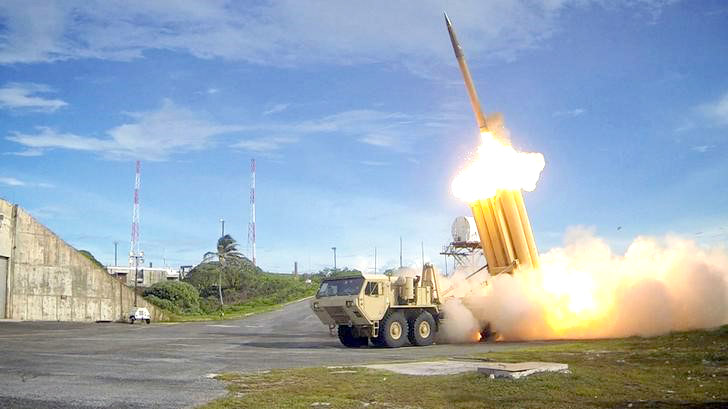By James Pearson
SEOUL (Reuters) – U.S. President Donald Trump’s suggestion that Seoul pay for the THAAD advanced U.S. missile defence system would be an “impossible option,” a top foreign policy adviser to South Korean presidential frontrunner Moon Jae-in said on Friday.
Trump told Reuters in an interview on Thursday he wants South Korea to pay for the $1 billion Terminal High Altitude Area Defence (THAAD) system.
“Even if we purchase THAAD, its main operation would be in the hands of the United States,” said Kim Ki-jung, a foreign policy adviser to Moon and professor at Seoul’s Yonsei University.
“So purchasing it would be an impossible option. That was our topic when we were considering the options,” Kim said.
Moon is leading polls by a wide margin ahead of a May 9 election to replace impeached former President Park Geun-hye, whose government agreed last year to deploy THAAD.
Lee Ji-soo, a spokesman for Moon, said campaign officials were aware of the reported comments by Trump and deliberating his demand that South Korea pay for THAAD but added that there was no official comment from Moon’s camp yet.
Trump, in the interview as he prepared to mark 100 days in office on Saturday, also accused another ally, Saudi Arabia, of not paying enough for the U.S. defence umbrella.
Trump’s comments harked back to his populist campaign rhetoric and Bonnie Glaser, an Asia expert at Washington’s Centre for Strategic and International Studies, said they betrayed a lack of strategic thinking.
“Trump’s remarks reflect his persistent desire for allies to pay more for their defence,” she said. “As far as their impact on South Korea’s election, they will likely boost support for Moon, and if he wins, it will make it harder for the U.S. to sustain a hardline policy against North Korea. So Trump’s remarks don’t seem very strategic to me.”
Trump’s comments provoked some consternation among Democrats and Republicans in the U.S. Congress.
Congressional aides noted the THAAD deployment came after years of discussions, in which South Korea took a great deal of convincing and then suffered economic retaliation from China.
“It just seems completely tone deaf … That system isn’t just good for South Korea, it’s also good for us,” one aide said, adding that it would also defend U.S. troops in South Korea and deter North Korea from targeting U.S. territory.
The U.S. military started THAAD deployment in early March, despite strong opposition from China, which says the system’s radar can be used to spy into its territory. The deployment has also prompted a North Korean warning of retaliation.
South Korea said on Wednesday major elements of the system were moved into the planned site in Seonjgu in the south of the country and would be fully operational by the end of this year.
That system will have initial operational capability “very soon,” a Pentagon spokesman told reporters on Friday.
The Pentagon has called THAAD a “critical measure” to defend South Koreans and U.S. forces and the top U.S. commander in the Pacific, Admiral Harry Harris, said the system would be operational “in coming days.”
Seonjgu residents have protested, citing safety fears and its potential to be a wartime target.
The United States currently has six THAAD batteries worldwide and a former U.S. State Department official, who estimated the cost of each at about $1.2 billion, said Washington would not want to sell THAAD to Seoul.
“We want to retain THAAD in our arsenal, consistent with all other U.S. weapons systems deployed on the Korean peninsula. We own them. We retain them. We have the right to redeploy them,” the official said, speaking on condition of anonymity.
(Reporting by James Pearson & Ju-min Park in Seoul; Additional reporting by David Brunnstrom, Patricia Zengerle, Matt Spetalnick and Phil Stewart in Washington; Editing by Simon Cameron-Moore and James Dalgleish)







